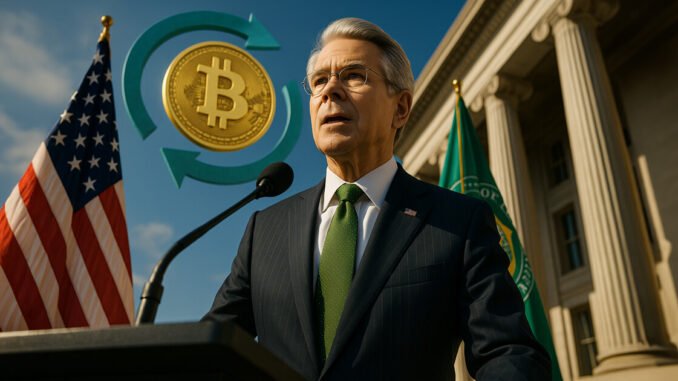
For the first time, a sitting U.S. Treasury Secretary has described Bitcoin as more than just a speculative frenzy. Scott Bessent’s post didn’t just set Crypto Twitter on fire; it marked a monumental shift in how policymakers view the number-one crypto. It’s a far cry from the days when Bitcoin lurked in the margins, constantly under attack from regulators as a nefarious actor’s favorite tool. Bessent posted:
“17 years after the white paper, the Bitcoin network is still operational and more resilient than ever. Bitcoin never shuts down. @SenateDems could learn something from that.”
A turning point for Bitcoin in Washington
Until recently, the prevailing D.C. narrative pegged Bitcoin and the broader crypto market as a regulatory headache. It was a threat to financial stability, or, at best, a shiny casino for retail maniacs and anarchists. “Operation Chokepoint 2.0” was, as any crypto OG will tell you, less of a conspiracy and more of a coordinated campaign.
Banks quietly cut ties with exchanges. Startups struggled for basic compliance services. For a while, the message from the top was clear: digital assets weren’t welcome at America’s money table.
So, seeing the Treasury Secretary frame Bitcoin as a system the government should learn from rather than suppress is a headline that would have sounded like satire just last year. More than that, it’s a public recognition that Bitcoin isn’t just a financial play; it’s a piece of critical, always-on American infrastructure.
Why the Treasury Secretary endorsement is a big deal
By calling attention to Bitcoin’s uptime and resilience, Bessent is rewriting the official script. This isn’t talk about wild price swings or ransomware headlines; far from it. Instead, it’s a subtle admission: Bitcoin is something the U.S. can learn from, not just regulate into submission.
Tagging the Senate Democrats was no accident, either. The legislative gridlock over policy has been relentless. The U.S. government has been shut down for a whole month; something Bitcoin never does. The network has powered on, processed transactions, bridged borders, survived bear markets, and proven itself, block by block, despite the political storms.
Of course, the Bitcoin community was proportionally euphoric about Bessent’s post. Hunter Horsley, CEO of Bitwise, commented:
“You’re bearish? Please see below. 2025, Bitcoin is going mainstream.”
Bitcoin advocate and investor Mark Moss responded:
“This is how the US leads the way! Let’s go!”
What’s wild is the context of this post, however. The vibe on Crypto Twitter has arguably never been more bearish. Bitcoin’s price may be hovering around $110,000, but “Uptober” hardly brought the rally investors were waiting for.
Analyst Will Clemente commented:
“The vibes in the crypto groupchats that I’m in are just sad honestly, people completely giving up and pivoting to other asset classes if they haven’t already. Everyone seems jaded, depressed, and defeated, & how can you blame them given how BTC has traded this year.”
Social sentiment, alt-mania, memecoins, BTC, RWAs, none of it is pumping. And yet, here is the Treasury Secretary singing Bitcoin’s praises.
Regulatory roadblocks are falling. The big money is finally showing up with mandates. Market structure is maturing by the week, and blue-chip institutions are quietly stacking sats.
The market is changing. Retail and Bitcoin OGs are giving way to institutional investors. Bitcoin is maturing as an asset class and is no longer subject to the wild price swings of the past, when a post like this from a U.S. Treasury Secretary would have sent the BTC price into orbit.
From Chokepoint to infrastructure
Despite the prevailing gloom, the significance of Bessent’s statement and this odd era of Bitcoin can’t be overstated. For most of its history, Bitcoin’s very existence was chalked up as a threat by officials. It was something to monitor, curtail, smother, or at least tax into submission. Now, for a Treasury official to champion its resilience and call out the system for its transparency and uptime is more than just a bull signal. It’s an invitation.
Washington may still bicker, and the narratives will keep whiplashing. But one thing is clear: after years of shadowboxing, the U.S. is finally pulling Bitcoin off the blacklist and putting it squarely in the infrastructure conversation. As policymakers scramble for answers, maybe it’s time they really, truly learned something from the network that “never shuts down.”


